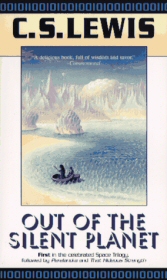A couple weeks ago, I announced my intention to develop a course on C. S. Lewis’s Ransom Trilogy. In preparation for it, I am digesting analyses of the books, but am also going back to them for a more in-depth study of Lewis’s wording, his thoughts, both theological and philosophical, and goals—what he wanted readers to come away with when they finished. It has been a few years since my last reading of Out of the Silent Planet, so I’m giving it a re-read with the knowledge that I will be teaching it for the first time when the course is ready.
What I’m discovering is that it is more complex and sophisticated than I originally thought. I’m almost ashamed to admit that I’ve always considered it the least of the three books, an attitude brought on perhaps by the knowledge that Mars is not really how Lewis describes it, and by the judgment that maybe he wasn’t really all that sharp about astronomy.
I know better now. Study of the man himself shows he had a keen interest in astronomy and that he knew before writing Out of the Silent Planet what Mars was most probably like. I didn’t understand in my earlier readings his love of the medieval worldview with respect to the planets. Naturally, he didn’t hold to the science of the medieval worldview, but he did believe that modern man has lost something precious—the view of a universe filled with meaning, not just empty space. One of his goals in this novel was to baptize the imagination of readers so they would grasp that the Lord of the universe doesn’t create meaningless things.
In chapter 5, as Ransom, kidnapped by Weston and Devine, becomes accustomed to traveling through what we now call space, he comes to a conclusion about what he witnesses all about him in the vast expanses outside earth’s orbit. Here’s the key paragraph:
But Ransom, as time wore on, became aware of another and more spiritual cause for his progressive lightening and exultation of heart. A nightmare, long engendered in the modern mind by the mythology that follows in the wake of science, was falling off him. He had read of “Space”: at the back of his thinking for years had lurked the dismal fancy of the black, cold vacuity, the utter deadness, which was supposed to separate the worlds.
He had not known how much it affected him till now—now that the very name “Space” seemed a blasphemous libel for this empyrean ocean of radiance in which they swam. He could not call it “dead”; he felt life pouring into him from it every moment. How indeed should it be otherwise, since out of this ocean the worlds and all their life had come?
He had thought it barren: he saw now that it was the womb of worlds, whose blazing and innumerable offspring looked down nightly even upon the earth with so many eyes—and here, with how many more!
No: space was the wrong name. Older thinkers had been wiser when they named it simply the heavens—the heavens which declared the glory—the “happy climes that ly Where day never shuts his eye Up in the broad fields of the sky.”
He quoted Milton’s words to himself lovingly, at this time and often.
This was not a black, cold vacuity. It was neither dead nor barren. It was teeming with life. This, of course, is why it’s not really accurate to call these books the Space Trilogy because it gives the wrong impression. What Lewis does is unique in comparison with typical science fiction depictions of—as he corrected the terminology—the heavens.
As the voyage was ending, and the ship was descending into Malacandra/Mars, Lewis offers another insight through the eyes of Ransom. The “chariot gliding in the fields of heaven” now transformed into merely “a dark steel box.” They were leaving the heavens behind and falling into a world. “Nothing in all his adventures bit so deeply into Ransom’s mind as this. He wondered how he could ever have thought of planets, even of the Earth, as islands of life and reality floating in a deadly void.” Ransom’s adventure had cured him of that perspective entirely. No one who had experienced what he had for those weeks, surrounded by the glory of God’s creation, could ever see it in the old way again.
Now with a certainty which never after deserted him, he saw the planets—the “earths” he called them in his thought—as mere holes or gaps in the living heaven—excluded and rejected wastes of heavy matter and murky air, formed not by addition to, but by subtraction from, the surrounding brightness.
Lewis concludes chapter 6 with this comment: “Things do not always happen as a man would expect. The moment of his arrival in an unknown world found Ransom wholly absorbed in a philosophical speculation.”
Yet this was clearly a speculation Lewis wanted readers to consider seriously. God is not absent from what we call “space.” He is everywhere. And even if science should tell us, as it does, that the medieval worldview is inaccurate scientifically, those medievalists inform us that modern science has, whether deliberately or not, inexcusably removed God from His creation. The universe is alive with His presence.
Where can I go to escape Your Spirit?
Where can I flee from your presence?
If I ascend to the heavens, You are there;
if I make my bed in Sheol, You are there.
If I rise on the wings of the dawn,
if I settle by the farthest sea,
even there Your hand will guide me;
Your right hand will hold me fast.
If I say, “Surely the darkness will hide me”—
even the darkness is not dark to You,
but the night shines like the day,
for darkness is as light to you.
Psalm 139:7-12
I’ll have more to share from this fascinating novel in a later post.


